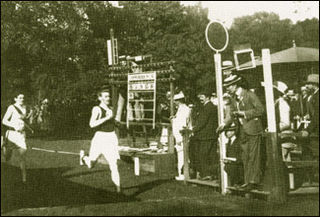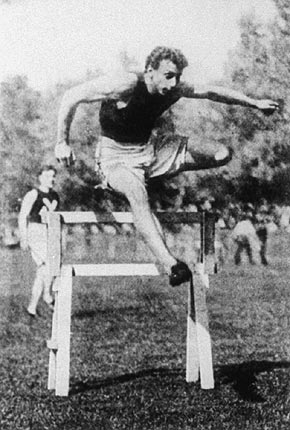The men's 400 metres was an Olympic event for the fourth time at the 1908 Summer Olympics in London. The competition was held from 21 July 1908, to 23 July 1908. The rerun of the final was held on 25 July 1908. The races were held on a track of 536.45 metres=1⁄3 mile in circumference.
The men's 800 metres made its fourth Olympic appearance at the 1908 Summer Olympics. The competition was held on July 20, 1908, and on July 21, 1908. The races were held on a track of 536.45 metres=1⁄3 mile in circumference. It was run in two rounds, with the winners of the eight heats of the first round competing in the final.

The men's 400 metres hurdles was the longer of two hurdling events at the 1908 Summer Olympics in London. It was the third time the event had been featured at the Olympics. The Olympic record was beat three times in the course of the Games. The competition was held from Monday, July 20, 1908, to Wednesday, July 22, 1908. 15 runners from six nations competed. NOCs could enter up to 12 athletes. The event was won by Charles Bacon of the United States, defeating teammate and defending champion Harry Hillman by 0.3 seconds in the final. It was the third gold medal in three Games for the American team in the event. Hillman was the first man to earn multiple medals in the 400 metres hurdles. Jimmy Tremeer of Great Britain earned bronze, the first medal for the nation in the men's 400 metres hurdles.

The men's 60 metres was the shortest of the track races at the 1900 Summer Olympics in Paris, which was the first time the event was held. It was held on 15 July 1900. 10 athletes from 6 nations competed. Five preliminary heats were scheduled, though only two were actually held. The top two athletes from each of the heats advanced to the final, resulting in a final race that featured three United States runners and an Australian. Hurdle specialist Alvin Kraenzlein of the United States won the event, with his countryman Walter Tewksbury in second and Australian Stan Rowley earning bronze.

The men's 100 metres was a sprinting event on the athletics programme at the 1900 Summer Olympics in Paris. It was held on July 14, 1900. 20 athletes from nine nations competed. The event was won by Mathew Chay Bender of the United States, the second of three straight gold medals by different Americans in the event. Australia medaled in the event for the first time, a bronze by Stan Rowley.

The men's 200 metres was a sprinting event on the athletics programme at the 1900 Summer Olympics in Paris. It was held on July 22, 1900, well after most of the rest of the athletics events. The 1900 Games were the first time the 200 metres was contested. The races were held on a track of 500 metres in circumference. Eight athletes from seven nations competed. The event was won by Walter Tewksbury of the United States. Norman Pritchard of India took silver while Australian Stan Rowley earned bronze.

The men's 800 metres was middle-distance running event on the athletics programme at the 1900 Summer Olympics in Paris. It was held on July 14 and July 16, 1900. The races were held on a track of 500 metres in circumference. 18 athletes from seven nations competed. The event was won by Alfred Tysoe of Great Britain, the nation's first medal in the event. The United States also won its first medals in the 800 metres, with silver and bronze.

The men's 110 metres hurdles was the first of the track and field events on the athletics programme at the 1900 Summer Olympics in Paris. It was held on July 14, 1900. Nine athletes from three nations competed in the shortest of the hurdling events. The event was won by Alvin Kraenzlein of the United States, the second of five consecutive victories for the nation in the first five Olympic Games. It was also the first of four consecutive podium sweeps for the Americans in the event.

The men's 200 metres hurdles was a hurdling event on the athletics programme at the 1900 Summer Olympics in Paris. It was held on July 16, 1900. 11 athletes from five nations competed in the middle of the three hurdling events. The event was won by Alvin Kraenzlein of the United States, earning his fourth individual gold in athletics in one Games—a record that still stands as of the 2016 Games. The silver medal went to Norman Pritchard of India, while another American earned bronze.

The men's 400 metres hurdles was a track & field athletics event at the 1900 Summer Olympics in Paris. This event was held for the first time at the Olympics. The competition took part on July 14 and July 15, 1900. The race was held on a track of 500 metres in circumference. Five athletes from four nations competed in the longest of the three hurdling events. The event was won by Walter Tewksbury of the United States. Henri Tauzin of France earned silver, while George Orton of Canada took bronze.

The men's 400 metres race was the second-shortest of the flat-track events on the Athletics at the 1896 Summer Olympics programme. The competition's preliminary round was the last held on the first day, 6 April. The competitors were split into two groups. The top two runners in each heat advanced to the final, which was held on the second day, 7 April.

The men's 400 metres was a track and field athletics event held as part of the Athletics at the 1912 Summer Olympics programme. The competition was held on Friday, July 12, 1912, and on Saturday, July 13, 1912. Forty-nine runners from 16 nations competed. NOCs could enter up to 12 athletes. The event was won by Charles Reidpath of the United States, the nation's fourth title in the event. Hanns Braun of Germany took silver, the nation's first medal in the men's 400 metres.

The men's 200 metres was a track and field athletics event held as part of the Athletics at the 1904 Summer Olympics programme. It was the second time the 200 metres was contested. All races of this competition was held on a straight course. 5 athletes from 3 nations participated. The competition was held on August 31, 1904. The United States swept the medals, with Archie Hahn earning the second of his three sprint medals in St. Louis. Nathaniel Cartmell took silver and William Hogenson earned bronze. It was the second consecutive American victory in the event.
The men's 400 metres event at the 1996 Summer Olympics in Atlanta, Georgia took place between 26 and 29 July. There were 62 competitors from 42 countries. The maximum number of athletes per nation had been set at 3 since the 1930 Olympic Congress.
The men's 400 metres was an event at the 1980 Summer Olympics in Moscow. The competition was held from July 27 to July 30, 1980. Fifty athletes from 32 nations competed. The maximum number of athletes per nation had been set at 3 since the 1930 Olympic Congress. The event was won by 0.24 seconds by Viktor Markin of the Soviet Union, the nation's first title in the men's 400 metres and first medal in the event since 1956. With the United States boycotting the Games, the country was not represented on the podium for the first time since 1920. Australia earned its first medal in the event with Rick Mitchell's silver, while East Germany won its first medal with Frank Schaffer's bronze, which was the first medal by any German since the United Team took silvers in 1956 and 1960.
The men's 400 metres event was part of the track and field athletics programme at the 1924 Summer Olympics. This race was depicted in the film Chariots of Fire. The competition was held on Thursday, July 10, 1924, and on Friday, July 11, 1924.
The men's 400 metres was an event at the 1976 Summer Olympics in Montreal. The competition was held on July 26, 1976, July 28, 1976, and on July 29, 1976. Forty-four athletes from 29 nations competed. The maximum number of athletes per nation had been set at 3 since the 1930 Olympic Congress. The event was won by 0.14 seconds by Alberto Juantorena of Cuba, the nation's first medal in the event, breaking a string of five victories by the United States. Juantorena became the first man to win both the 800 metres and 400 metres in an Olympics. His winning time of 44.26 seconds remained as the fastest time at sea level until it was broken by Butch Reynolds in May 1987 in Columbus, Ohio.
The men's 400 metres sprint event at the 1932 Olympic Games took place on August 4 and August 5 at the Los Angeles Memorial Coliseum. Twenty-seven athletes from 15 nations competed. The 1930 Olympic Congress in Berlin had reduced the limit from 4 athletes per NOC to 3 athletes. The event was won by Bill Carr of the United States, that nation's second consecutive title and sixth overall in the event. Ben Eastman's silver marked the first time countrymen had gone one-two in the event since the United States did it at the first three Olympics.

The men's 400 metres hurdles event at the 1952 Summer Olympics took place July 20–21, 1952 at the Helsinki Olympic Stadium. There were 40 competitors from 24 nations. The maximum number of athletes per nation had been set at 3 since the 1930 Olympic Congress. The final was won by American Charles Moore. It was the nation's third consecutive and eighth overall victory in the event. The Soviet Union, in its debut, and New Zealand each earned their first medal in the men's 400 metres hurdles, with Yuriy Lituyev's silver and John Holland's bronze, respectively.
The men's 400 metres was an event at the 1972 Summer Olympics in Munich. The competition was held on 3, 4 and 7 September. Sixty-four athletes from 49 nations competed. The maximum number of athletes per nation had been set at 3 since the 1930 Olympic Congress. The event was won by 0.14 seconds by Vince Matthews of the United States, the nation's fifth consecutive and 12th overall victory in the event. The Americans' hopes to repeat their podium sweep of four years earlier were dashed by injury in the final. Bronze medalist Julius Sang became the first black African to win a sprint Olympic medal, earning Kenya's first medal in the event.











